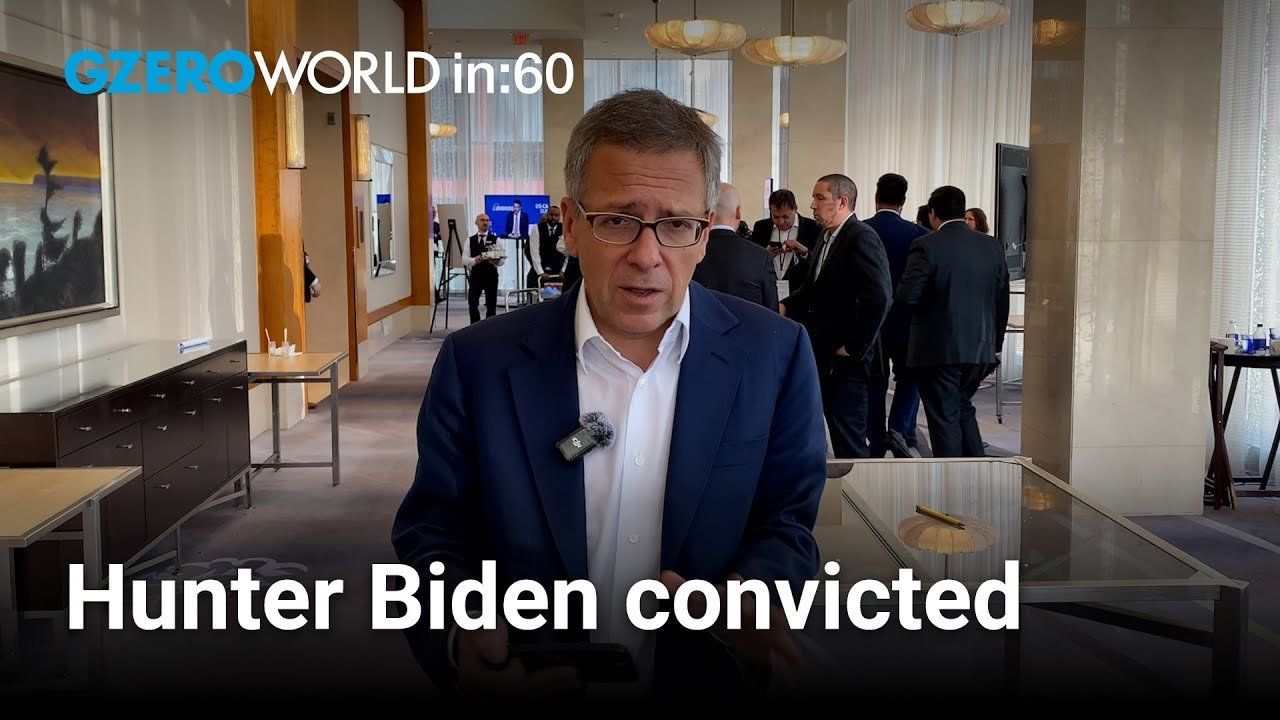Ian Bremmer shares his insights on global politics this week on World In :60, live from the Toronto US-Canada Summit.
What are the implications of Hunter Biden's convictions for his father's presidential campaign?
You know, it's a little bit of tit for tat. You're going to see a lot of Republicans saying, “See the Biden crime family! Look at this guy. I mean, he's a convict.” It's ugly. It's embarrassing for the Biden family, of course. But at the same time, it's not very significant charges and it certainly doesn't link directly to President Biden. Five months away, are people going to be talking about this or Trump's 34 convictions, the weakest of the cases that he's actually facing? I suspect neither of them are going to matter very much, even though, on balance, Trump's is the one that should matter more.
Will recent EU elections bring a dramatic shift to Europe or more of the same?
Well, overall, the European Parliament looks a lot like the old European Parliament. A few more seats for the right wing, but the far-right is not very aligned, doesn't work cohesively. I still think Ursula von der Leyen is going to be, yet again, European Commission president. And in many countries the populist, the anti-establishment did a lot worse. In Sweden, for example, in Portugal and others. On balance, there's not much change here. Two things that matter one a little bit is that Schulz and his Social Democrats really underperformed. The German economy not doing well, he's not seen as much of a leader. A three-party coalition, Germany, largely centrist and pretty stable no matter what. Much bigger: France. Macron's party, historically, got pasted. That's why he's called for parliamentary elections in just a few weeks. And when they happen, if Le Pen's party, the National Rally, wins and they're able to put forward a prime minister, there's is a major, major problem for governance in France and for the need of anything that the EU has to have parliamentary approval in France to get done, and that includes the Ukraine problem going forward.
How Canadians viewing the impending Biden Trump rematch?
You know, in some ways a little more comfortably than they did the last time around because the US-Mexico-Canada agreement's already in place and Trump got it done with this Canadian government. So, I think that they feel a little like, “Hey, we dealt with them once, we can deal with them again.” There's much more strategy and strategic alignment in the importance of the US-Canada relationship today than there was five, 10 years ago, in part because on China they're much more aligned, on things like, major wars outside of this part of the world, they're much more aligned, on Haiti, they're much more aligned. But also keep in mind that Canada's also facing an election in a year. And right now, it looks like the Tories, the conservatives in Canada, would win big, ahead by over 20 points. In which case you'd have a Canadian government and a US government, if Trump were to win, that would be very aligned. Just on a very different part of the political spectrum. Either way, very friendly and very stable relationship, which is more than we can say for most of them around the world.
More For You
On the sidelines of the 2026 Munich Security Conference, Annemarie Hou, Executive Director of the United Nations Office of Partnerships, joined Tony Maciulis to discuss the power of women leaders in global decision-making.
Most Popular
Alina Polyakova, President and CEO of the Center for European Policy Analysis, warns that NATO faces a defining moment.
From the sidelines of the 62nd Munich Security Conference in Munich, Polyakova told GZERO's Tony Maciulis that the Arctic has become “an arena of incredible global competition,” with Russia and China expanding their ambitions. While President Trump’s focus reflects “the right instincts” on security, she argues allies must strike a mutual deal to secure the region together.
